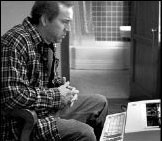There are three Kaufmans involved with Adaptation: the real, corporeal Charlie Kaufman, who wrote the screenplay and gave a roundtable interview in Seattle with his star, Nicolas Cage, and director Spike Jonze; the movie’s version of Charlie Kaufman (played by Cage); and Donald, Charlie’s identical twin in the movie (also played by Cage). According to the credits, the movie was co-written by Charlie and Donald Kaufman. “It’s important to understand that Donald co-wrote the movie,” says the real Kaufman—but he refuses to say whether Donald exists.
What the heck does it mean that the movie was co-written by the actual author’s probably imaginary doppelg䮧er brother? Who knows. But the real Charlie sheds some light on the Kaufman conundrum—and his very control-freaky elliptical response is a key to what’s going on. Kaufman in life is utterly unlike the Charlie on-screen: tough, confident, unsweaty, and actually better looking than the star who plays him. (Cage is rather homely and diffident in person.) “It was never the intention for [Cage] to do an impersonation of me,” Charlie says.
Susan Orlean, the former Portland alternative-press journalist who wrote The Orchid Thief, thinks the two fictional Kaufmans capture a duality that’s in Nicolas Cage as well: “It’s perfect that Nicolas Cage be in that part,” she says by phone from Manhattan. “He does very serious art movies and action Hollywood movies. It seems to perfectly reflect his career choices.” True. And Cage says he particularly identified with the self-esteem-deprived Charlie Kaufman character: “I felt like I could hit the notes because I’ve been there.”
The existence of two faux Kaufmans is the most striking example of what makes flesh-and-blood Kaufman an utterly distinctive writer on the Hollywood scene: his peculiarly contrapuntal imagination. “I’ve developed a system where I collaborate with myself on movies,” he says. “I try to throw in disparate things, so I’m forced to go in a direction I wouldn’t ordinarily go. The original idea in Being John Malkovich was to write a story about a man who falls in love with a woman not his wife, and another movie about someone who becomes John Malkovich.” Other films have been made by merging two distinct scripts (e.g., Breaking Away), but for Kaufman, such a collision is central to his process. He needs two strands of DNA to get his imagination rolling. Adaptation is his strangest mutation yet.
Tim Appelo








